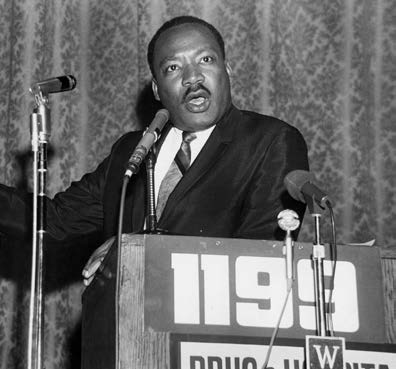Dr. King Is Our North Star
April 4, 2018
Written by: George Gresham, 1199SEIU President

I joined my parents in New York when I was 8. During the coming years, our nation passed landmark legislation such as the Civil Rights Act of 1964, the Voting Rights Act of 1965 and the Fair Housing Act of 1968. The broad movement that Dr. King led was the driving force behind these landmark accomplishments. My parents spoke of Dr. King’s leadership, and at an early age I became a follower of Dr. King, Malcolm X, Harry Belafonte and Muhammad Ali. But I did not fully understand Dr. King’s greatness and genius until I joined 1199. As an 1199er I learned that on March 10, 1968, less than a month before his assassination, Dr. King told a New York City meeting of 1199ers, “There are times . . . that I’m often disenchanted with segments of the power structure of the labor movement. But in these moments of disenchantment, I begin to think of unions like Local 1199 and it gives me renewed courage and vigor to carry on.”
Calling 1199 his favorite union, Dr. King added, “If all of labor would emulate what you have been doing over the years, our nation would be closer to victory in the fight to eliminate poverty and injustice.” Dr. King thanked 1199 for its principled struggles against economic exploitation, racism and militarism— the interconnected evils that he, too, fought mightily against.
I don’t mention Dr. King’s praise of our Union as a boast, but as a challenge. Throughout our Union’s history, we have risen to that challenge by picking up his torch and following the path he forged. His example and teachings are as relevant today as they were a half-century ago. That is why I refer to him as our Union’s North Star.
Political leaders and pundits highlight Dr. King’s nonviolence and love of humankind. Those qualities cannot be denied. But Dr. King was much more. He was a drum major for justice, an exceptional organizer who used civil disobedience to both build a powerful movement and rouse the nation’s conscience. And I am proud that our Union stood with him during challenging moments when he courageously took positions on foreign and domestic policies that others— including civil rights allies—harshly criticized.
History has confirmed the correctness of Dr. King’s positions and his incomparable contributions to our nation. Former President Barack Obama, who frequently referenced Dr. King, did so in Selma, Alabama, during the 50th anniversary of the march across the Edmund Pettus Bridge that led to passage of the Voting Rights Act. President Obama said in praise of non-violent resistance and struggle: “What greater expression of faith in the American experiment than this, what greater form of patriotism is there than the belief that America is not yet finished, that we are strong enough to be self-critical, that each successive generation can look upon our imperfections and decide that it is in our power to remake this nation to more closely align with our highest ideals?”
Few have done more to call our nation to its highest ideals than Dr. King. Thankfully his work continues, most importantly through the Rev. William Barber and Dr. Liz Theoharis, leaders of the 2018 Poor People’s Campaign—a revival of Dr. King’s movement a half-century ago to bring about a radical redistribution of economic and political power. We can pay Dr. King no greater honor than to further those causes for which he gave his far-too-short life.
- 1199 Magazine | March / April 2018

